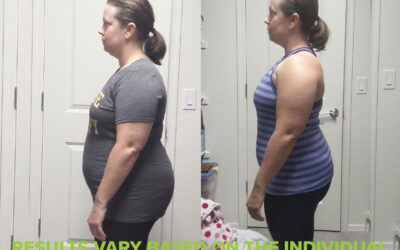When people talk about weight loss, it’s all too common to hear about “metabolism.” Some individuals blame a sluggish metabolism for stubborn belly fat, while others pin their rapid weight fluctuations on an overactive one. Often, information around this essential bodily function is more myth than fact. Having been in the health and nutrition industry for almost 30 years, I’ve come across many misconceptions about metabolism. I’m here to clear them up and offer a path toward weight loss, sustainable health improvements, and, if you’re like many of my clients in Scottsdale, Phoenix, Chandler, and Gilbert, a concrete strategy for tackling issues such as menopausal belly fat. You might be wondering why my opinion matters on the subject of metabolism especially when there’s so much noise online, from fad diets to celebrity influencers. The truth is, not only have I dedicated most of my professional life to understanding how our body processes food and converts it into energy, but I’ve also personally coached countless individuals toward real, long-lasting results through Personalized Nutrition Concepts (PNC). Over the years, I’ve seen firsthand how certain myths surrounding metabolism can hold people back from achieving their health goals whether that’s athletic performance, anti-aging, or plain old simple weight loss. My passion for personalized nutrition stems from seeing the unique hurdles everyone faces. There is no one-size-fits-all method in health each approach must factor in personal history, hormone changes, lifestyle, and countless other details. Even more so, each of us has a different metabolic rate, which further underscores why a customized diet plan is so crucial. By zeroing in on individual needs, you not only increase the chances of achieving your desired goal be it losing menopausal belly fat or boosting your overall well-being but you also help prevent the frustration that comes from following generic, mass-produced guidelines. The problem is that many people hold onto outdated beliefs about metabolism. These beliefs can derail our quest for true health improvement, weight loss, or anti-aging benefits, because they create unrealistic expectations. If we’re stuck thinking there’s a magic metabolism hack that only requires popping a pill or drinking some special tea, we miss out on the real science behind how our bodies burn calories and build muscle.
Myth #1: You Have a Slow Metabolism, and There’s Nothing You Can Do About It
It’s easy to blame a “slow metabolism” when we can’t lose weight. While genetics do play a role in how efficiently your body turns food into energy, there are steps you can take to manage and optimize your metabolic rate. Our body’s metabolism is affected by age, hormonal changes, muscle mass, activity level, and even quality of sleep. The good news is that you can make small, consistent changes over time like incorporating more movement into your daily routine, adjusting your diet, and managing stress levels that help keep your metabolism firing steadily. If you’re a woman experiencing menopausal weight gain, you might believe your metabolism is doomed. However, targeted strategies exist to combat menopausal belly fat. At Personalized Nutrition Concepts, we craft tailored nutrition programs that account for these shifting hormonal needs, focusing on fueling your body with nutrients that boost metabolism. This might mean incorporating more high-quality protein to build muscle muscle, after all, burns more calories than fat, and can be your ally in the battle against belly fat.
Myth #2: Skipping Meals Will Speed Up Weight Loss by Cutting Calories
We’ve all heard it, right? The belief that eating less automatically translates to losing weight faster. Yet, this extreme approach can backfire by causing metabolic slowdown. When your body thinks it’s starving, it holds onto every last calorie and fat cell for dear life, which hinders your weight loss efforts. This is why fad diets that drastically restrict calories may work in the very short term, but can also wreak havoc on your metabolism in the long run. I commonly see this in Phoenix, Chandler, and other bustling communities where individuals try to juggle stressful lifestyles with quick weight loss solutions. Sustainable weight loss doesn’t come from starving yourself; it comes from giving your body the necessary nutrients to function optimally. Regular, balanced meals that support cellular rejuvenation are key to keeping your metabolism in a healthy range. This keeps your body’s systems humming along, reduces cravings, and even helps you maintain better mental clarity.
Myth #3: You Can’t Lose Weight After 50 Because Your Metabolism Is Too Slow
I can’t tell you how many times I’ve met clients in Scottsdale or Gilbert who say, “I’m over 50, so I guess weight loss isn’t in the cards for me anymore.” The belief that age is a guaranteed roadblock to losing belly fat or improving overall health is just plain wrong. While there’s no denying that hormonal changes in menopause can slow your metabolic rate, they don’t completely shut it down. The same building blocks of good health apply: consistent exercise (both cardio and resistance training), a balanced, nutrient-dense diet, and adequate sleep. What often changes after 50 is our response to certain foods and certain types of exercise. Our approach needs to be fine-tuned with more care to address hormonal fluctuations. If you’re still embracing the same habits you had in your 20s or 30s, you might be working against your body. A customized weight loss plan that focuses on nutrition coaching can help you better navigate these changes by creating an environment where your body can still shed unwanted pounds even those stubborn inches around the waist.
Myth #4: Metabolism Boosters Like Coffee or Spicy Foods Will Do All the Work for You
Yes, certain substances can give your metabolism a minor nudge. For instance, caffeine may increase your short-term metabolic rate and foods like chili peppers can heat up your body, leading to a brief uptick in calorie burning. But these are temporary boosts that can’t replace a well-thought-out nutritional and exercise strategy. If you rely solely on these “miracle” foods for lasting weight loss or belly fat reduction, you may be disappointed. Instead, think of them as small allies that can complement a holistic plan. Personalized nutrition plans for athletes, for instance, may incorporate some strategically timed coffee intake or specific spices to take advantage of these brief effects. However, the real linchpin of a successful, long-term approach is sustainable, balanced living from the foods you eat to the way you move your body. I’ve seen this in practice with my own clients, who have tried everything under the sun but finally find results once they adopt a coordinated, multi-faceted plan.
Myth #5: Metabolic Rate Is the Same for Everyone, So One Diet Should Fit All
If you’re reading this, chances are you’ve felt confused by conflicting nutrition advice at one point or another. This is where personalized nutrition truly shines. Your body is as unique as your fingerprint, influenced by factors like genetics, lifestyle, and medical history. Pretending everyone has the same metabolic rate and needs the same macros is a recipe for frustration. Effective weight loss programs without starvation hinge on recognizing your specific metabolic type. Maybe your neighbor thrived on a high-protein, lower-carb plan, while you ended up feeling drained and dizzy. That doesn’t mean a high-protein plan is universally good or bad; it means it worked for your neighbor’s body, not yours. The trick is in understanding your distinctive metabolic makeup and crafting a custom strategy that propels you toward your goals without wrecking your relationship with food. If you’re seeking ways to reduce belly fat during menopause, for example, it’s crucial to pinpoint the foods and eating patterns that help stabilize your hormones and maintain muscle mass. Maybe that means playing with different protein sources or focusing on fiber-rich vegetables that curb cravings and regulate blood sugar levels. Properly balancing these factors can effectively boost your metabolism so that you’re better able to manage weight, especially when hormones might not always be on your side.
Getting Your Metabolism in Check
So, how can you move forward with an approach that’s right for your body? The solution starts by acknowledging the role nutrition, exercise, and healthy lifestyle habits play in shaping a robust metabolism. At Personalized Nutrition Concepts, I help my clients identify these hidden influencers to build a blueprint for sustainable weight loss, health improvement, and even anti-aging benefits. This might look like thoroughly assessing your current eating habits, daily activity patterns, sleep schedule, and stress management practices. From there, it’s about fine-tuning those elements. If you’re dealing with menopausal weight gain, we might emphasize certain nutrient ratios, meal timing strategies, and supplementation to address hormonal imbalances. If athletic performance is your main concern, we might incorporate targeted meal plans around workout windows to optimize performance and recovery. No matter the case, the takeaway is clear: Metabolism is dynamic. You’re not stuck with a “bad” metabolism forever, nor are you entirely reliant on a one-size-fits-all diet. True transformation happens when we tailor a plan to your lifestyle and needs, focusing on cellular rejuvenation, sustainable weight loss, and targeted strategies to combat the unique challenges you face.
A Call to Understand and Transform Your Metabolism
In closing, dispelling these common myths about metabolism is the first step to regaining confidence in your body’s ability to change. Whether you live in the greater Phoenix area or are tuning in from elsewhere, I hope you understand that metabolism isn’t some elusive bogeyman. It’s a life-sustaining process we can support through intentional action. Ready to break free from half-baked ideas and discover what truly works for your body? Start by analyzing your own dietary patterns. Are you skipping meals under the assumption that less food is automatically better? Do you brush aside strength training and rely solely on cardio, believing muscle mass doesn’t matter? By addressing these misconceptions, you can rewrite the story of your metabolism and take steps toward the leaner, healthier version of yourself that may have once felt out of reach. If you’re looking for hands-on guidance, I invite you to explore Personalized Nutrition Concepts or schedule a consultation. My decades of experience, combined with your commitment, can lead to significant changes in how you look, feel, and move through life. So why not invest in yourself? Why not harness the power of personalized nutrition to rewrite old metabolism myths and aim for a future brimming with health, vitality, and confidence?



0 Comments